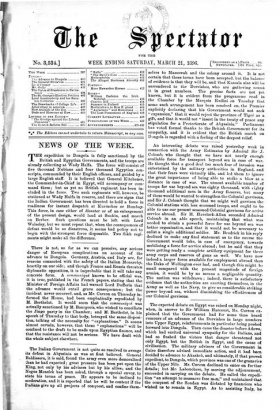An interesting debate was raised yesterday week in connection with
the Army Estimates by Admiral Sir J. Colomb, who thought that we have not nearly enough available force for transport beyond sea in case of war. He thought that a good deal too much fear of invasion was entertained by the military authorities in England, and that their fears were virtually idle, and led them to ignore the great importance of being able to strike a blow at a distance in ease of war. The utmost available number of troops for use beyond sea was eighty thousand, with tiAllty thousand additional men in the Army Reserve, but many of these would be wanted to strengthen the Colonial garrisons, and Sir J. Colomb thought that we might well garrison the Colonial stations with less seasoned troops, and ought to be able to use our present seasoned Colonial garrisons for active service abroad. Sir H. Havelock-Allan seconded Admiral Colomb in an able speech, maintaining that what was needed to obtain a powerful force for use beyond sea was better organisation, and that it would not be necessary to enlist a single additional soldier. Mr. Brodrick in his reply declined to make any final statement as to the course the Government would take, in case of emergency, towards mobilising a force for service abroad ; but he said that they were getting ready a complete artillery equipment for three army corps and reserves of guns as well. We have now indeed a larger force available for employment abroad than the Duke of Wellington ever bad, and though this might be small compared with the present magnitude of foreign armies, it would be by no means a negligeable quantity. The motion was withdrawn ; indeed, there is satisfactory evidence that the authorities are exerting themselves, in the Army as well as the Navy, to give us considerable striking power beyond sea, without diminishing the effectiveness of our Colonial garrisons.






































